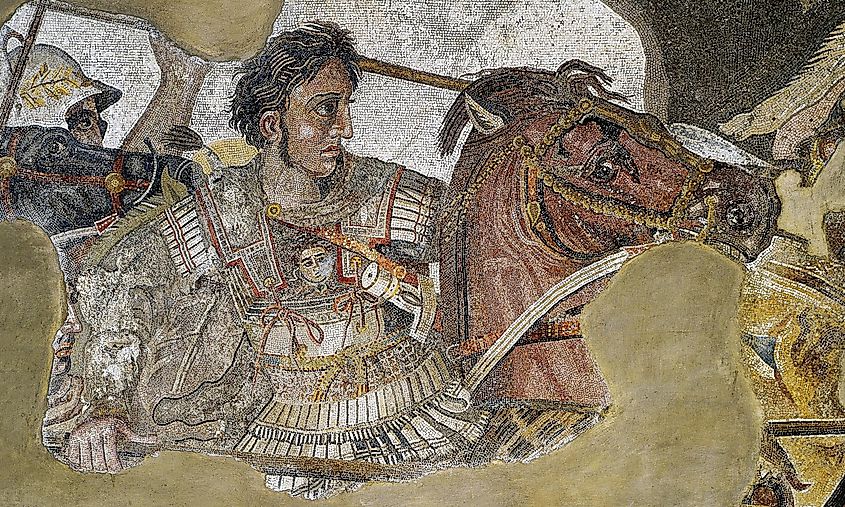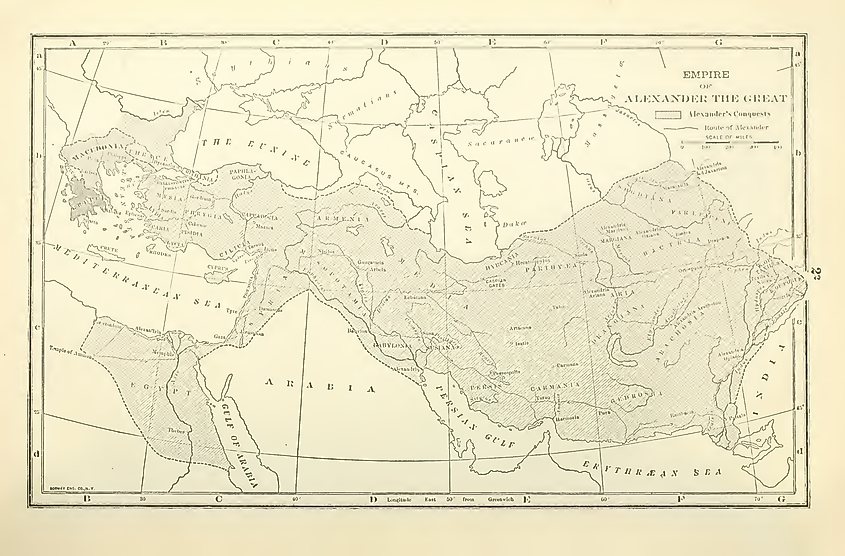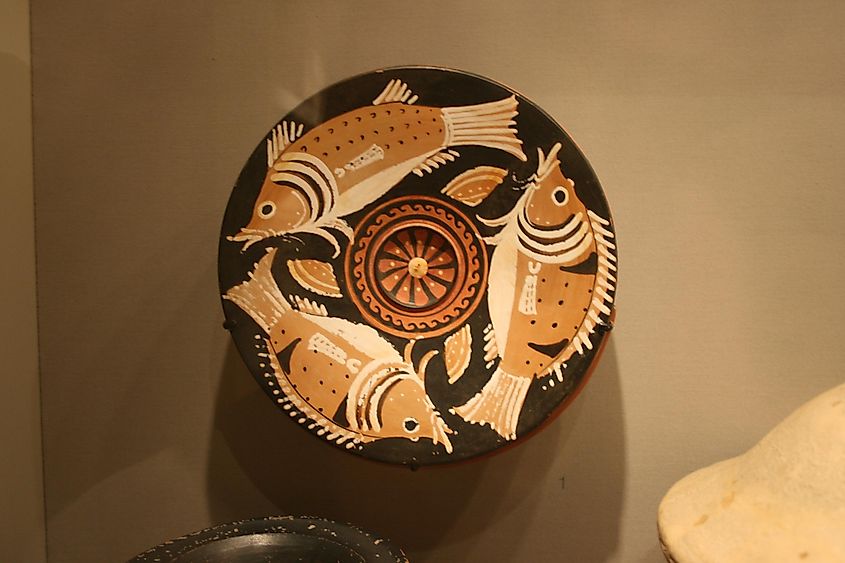
Why Didn’t Alexander the Great Invade Rome?
In thirteen years, Alexander the Great built one of the greatest empires the world has ever seen. He was thirty-two when he died in 323 BC. Yet, with the, now-legendary, neighboring Rome just across the Adriatic Sea to the west, why did Alexander focus his efforts to the east toward the Persian Empire? He may have eventually aimed west had he not died so young. Still, other realities like politics, geography, and the relatively small influence of Rome (at that time) weighed heavily into Alexander's aversion to a westward march.
Most importantly, one must remember that Alexander was not an isolated willpower, indifferent to the councils and Greek powers that supported him: that support came with an understanding that he would represent Greek and Macedonian interests. Essentially, Persia was a much more significant threat and land of opportunity for Macedonians in this era than Rome.
However, close proximity between two empires can bring tension and competition, and the Macedonian Wars (214 to 148 BC) between Rome and Greece ultimately resulted in the Roman conquest of Greece just a century later. Perhaps Alexander, had he lived on, would have supported the future of Greece by targeting the Italian Peninsula and eliminating that future threat. Still, for the following host of reasons, he began with Persia.
Timing and Objectives

During the reign of Alexander the Great from 356 to 323 BCE, the Roman Republic was emerging as a significant power within the Italian Peninsula. Still, it had not yet established itself as a dominant force in the Mediterranean world that would later command the attention of great empires. Alexander's objectives were primarily centered around the conquest of the Persian Empire. This goal was both a matter of avenging previous Persian invasions of Greece and of seizing the immense wealth and resources that Persia represented. In contrast, Rome during this period was relatively modest in wealth and military power, presenting neither a direct threat nor a lucrative incentive that could justify the logistical and military efforts required for an invasion across the Adriatic Sea into the Italian Peninsula.
Alexander's concept of "world conquest" was significantly influenced by the prevailing Greek worldview, which saw the Persian Empire as the ultimate frontier of the known world. This perspective prioritized the East over the West, directing Alexander's military campaigns toward Asia rather than the Western regions where Rome was located. Moreover, the cultural and political objectives that fueled Alexander's ambitions were deeply rooted in Greek history and the collective memory of Persian aggression, motivations that had little relevance to the Roman Republic, which had not (yet) engaged in hostilities with the Greek states.
Geographical Focus

Alexander the Great's military campaigns demonstrated a clear geographical focus that significantly influenced his decision not to invade Rome. Alexander's journey commenced from Macedonia, extending through Asia Minor, down into Egypt, and across to the far reaches of the Persian Empire. The regions Alexander subdued were rich in resources and held critical positions along significant trade routes, facilitating the control of commerce and the accumulation of wealth necessary to sustain his expansive empire.
The distance and logistical challenges of mounting a campaign from Alexander's easternmost conquests to Rome were formidable. Between these eastern territories and Rome lay vast distances, requiring the movement of armies over rugged terrains and the Adriatic Sea. The logistical complexities of provisioning such a campaign, including ensuring a steady supply of food, equipment, and reinforcements across these terrains, would have been a monumental task. Unlike the areas Alexander chose to conquer, which often had established networks of roads and cities that could support his logistics (a precursor to the legendary silk road), the route to Rome presented a different set of challenges, compounded by the lack of a significant Greek presence in the Italian Peninsula that might have facilitated his advance.
Rome's Status

In the late 4th century BC, Rome's political and military status was notably inferior to that of the Persian Empire, and Rome did not become a threat to Greece until the Macedonian Wars, a hundred years later. In contrast to the Persian Empire, Rome was emerging from its early republican phase, embroiled in local conflicts, and significantly lacked the military might or political influence that characterized the Persian territories. This difference in military capabilities suggests that Rome did not present enough threat, challenge, or prize worth diverting Alexander's resources and attention from his primary objective.
Furthermore, the socio-economic structure of Rome during this period was rudimentary compared to the sophisticated systems of the East. The city's economy and its surrounding regions were based on agriculture and pastoralism, with a limited scope for trade, especially in comparison to the lucrative trade routes controlled by the Persian Empire. This lack of economic appeal diminished Rome's significance in Alexander's considerations, as the Macedonian conquests were partially driven by the desire to control wealthy territories that could finance his campaigns and support his empire's expansion.
The power dynamics within the Italian Peninsula also played a role in diminishing Rome's appeal. At the time, Rome was one of many city-states in the region, engaged in constant warfare with its neighbors for local dominance. Its influence was confined to a relatively small area, lacking the historical or legendary significance that regions like Egypt or Persia held for the Greeks and Macedonians. Such an environment likely seemed parochial to a conqueror who had ambitions that spanned continents. Ultimately, Alexander sought to conquer well-known, wealthy, and culturally significant regions to legitimize his rule and fulfill his vision of a Hellenistic empire.
Political and Military Priorities

Central to understanding Alexander's decision not to invade Rome is analyzing his overarching goal: the annexation of the Persian Empire. This objective was not simply a military campaign but a personal ambition fuelled by the desire to surpass the achievements of his predecessors and unify the Greek city-states under his rule. The League of Corinth, a federation of Greek states, provided Alexander with the necessary military backing, recognizing him as the leader in the common cause against Persia. This alliance was pivotal, as it consolidated his position in Greece and directed his military might eastward, towards the Persian Empire, rather than west towards Rome.
The influence of intelligence and reconnaissance cannot be understated in shaping Alexander's campaigns. His decisions were informed by detailed knowledge of the territories ahead, including the strengths and weaknesses of the Persian Empire. This intelligence allowed him to prioritize his military objectives and allocate resources efficiently, ensuring that his focus remained on the Persian front.
Moreover, Alexander's educational background under the tutelage of Aristotle equipped him with a unique perspective on governance and empire-building. His vision extended beyond mere conquest; he aimed to integrate the vast territories under his control, emphasizing the importance of a unified administration that could manage the challenges posed by such a large empire. This vision included the use of marriage alliances to cement relationships and secure loyalty across different regions, thereby stabilizing his rule.
The necessity of securing the eastern frontiers was also paramount. Alexander recognized the need to protect his empire's borders against potential threats and rebellions. This necessitated the deployment of Macedonian and allied Greek forces in key regions, ensuring that the empire's vast expanse was defendable.
In the aftermath of Alexander's death, the division of his empire among his generals underscores the administrative and military challenges of maintaining such a vast territory. The focus shifted from expansion to maintaining control over divided regions, further illustrating why the conquest of Rome was never pursued. The priority was always conquering and administrating the territories of the Persian Empire, leaving little room for additional campaigns in the West.











